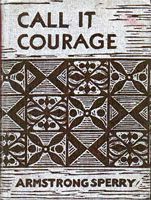|
|
Call It Courageby Armstrong Sperry
|
|
|
Call It Courageby Armstrong Sperry
|
 |
This book is the reason most people still know of Sperry's work. It has been in print continuously for nearly sixty years, a testament to the endurance of this story's appeal, and the influence of a Newbery Medal. Most editions -- in English and the more than two-dozen languages it has been translated into (see six of them below) -- include ten full-page blue-and-white illustrations, sundry smaller illustrations, marginalia, and chapter headings. Earlier editions, seen at left, also had illustrated endpapers and a buckrum cloth cover on the front and back boards, with a woodcut inspired by Polynesian tapa cloth designs, which is used as the background pattern on this page. In the United Kingdom, Call It Courage was published under the title The Boy Who Was Afraid. Call it Courage was filmed for television with a teleplay by Ben Masselink and a narration by Gerald Pearce, and appeared on The Wonderful World of Disney for the first time in April 1974. |
|
From the dustjacket:
Mafatu was afraid of the sea. It had taken his mother when he was a baby, and it seemed to him that the sea gods sought vengeance at having been cheated of Mafatu. So, though he was the son of the Great Chief of Hikueru, a race of Polynesians who worshipped courage, and he was named Stout Heart, he fear and avoided the sea, till everyone branded him a coward.
When he could no longer bear their taunts and jibes, he determined to conquer that fear or be conquered -- so he went off in his canoe, alone except for his little dog and pet albatross. A storm gave him his first challenge. Then days on a desert island found him resourceful beyond his own expectation. This is the story of how his courage grew and how he finally returned home exhausted in body, but strong and fearless in spirit -- truly Mafatu, the Stout Heart.
This is a legend. It happened many years ago, but even today the people of Hikueru sing this story and tell it over their evening fires.
"Whether this author is telling of clipper ships, of the days of the covered wagon, of the South Sea islands, he writes always with imagination and integrity. Like all hero legends Mafatu's story has a strength and simplicity that appeals to a wide range in age and is beautifully told. Mr. Sperry's fine drawings have the same spirit of adventure as the story and enhance the feeling, of tropical seas and jungle given in the text. The story reads aloud well and will be useful to storytellers."--New York Times
"A boy's character at ten years old is more often influenced by emotion than by reasoning. Something in the conduct of a hero leaps like a spark to light his own spirit. A book with a hero can sometimes bring this about. This is such a book.... It is related with unusual skill, carrying along a reader so rapidly he scarcely realizes how well it is being told.... The story is wild enough to be remembered, and it cannot be remembered without doing good."
--New York Herald Tribune
|
|
|
|
|
|
Dahai de haizi |
Esto es coraje |
Mafatu: een jongen die moed had |
The Boy Who Was Afraid |
|
|
|
|
|
|
Kalla det mod |
Le Garšon qui avait peur |
Mafatu hei▀t "Starkes Herz" |
In Ra Migooyand Shoja'at |
|
Others include: Afrikaans (Die seun wat bang was), Japanese, Norwegian (Mafatu, gutten som var redd), Samoan (Alaga ia, o le lototele!, translated by Fanaafi Ma`ia`i Larkin, 1965), Finnish, Hindi, Turkish (Yigitlik buna derler), Indonesian, Arabic, Urdu, Czech (Odvaha), Hebrew (Ha-naar Mofotu), and Braille. There are additional translations into Chinese ( Hai shang xiao yong shi and Ta hai ti hai tzu) and German (Allein gegen die Angst and Mut, Mafatu!). |
|||